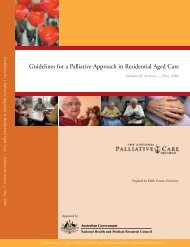The hardest thing we have ever done - Palliative Care Australia
The hardest thing we have ever done - Palliative Care Australia
The hardest thing we have ever done - Palliative Care Australia
You also want an ePaper? Increase the reach of your titles
YUMPU automatically turns print PDFs into web optimized ePapers that Google loves.
• accurate information about the trajectory of the illness, symptoms the person is likely to<br />
experience, treatments and related medical information so that they can plan for the<br />
needs of the terminally ill person - professional organisations such as the National<br />
Cancer Control Initiative, <strong>Care</strong>rs Associations, National Association of Loss and Grief, and<br />
the National Heart Foundation provide appropriate information<br />
• psycho-educational programs and support and strategies from specially trained<br />
counseling and health psychologists, palliative care organisations or specific illness<br />
programs such as those conducted by the Cancer Council in some states to assist carers<br />
in communications and their role as patient advocates<br />
• information on how to access palliative care organisations for the last stages of the<br />
illness to receive respite and quality care at times when the carer is most emotionally<br />
and physically vulnerable<br />
• further support and resources to provide them with the necessary skills and expertise,<br />
which will enable them to fulfill their roles with confidence.<br />
In addition, the <strong>Australia</strong>n Psychological Society suggested the following strategies for carers<br />
to help them cope and manage the daily tasks of caring:<br />
• sharing the tasks of caring if possible, feeling ok about delegating, giving specific tasks<br />
to family members and friends if they are willing, such as rostering, visits, childcare<br />
• taking each day at a time, pausing to reflect on some<strong>thing</strong> positive each day (alone, with<br />
the person who is ill and/or supportive family members and friends)<br />
• taking time each day to do some<strong>thing</strong> for oneself, to build in small rests and to learn to<br />
pace oneself where possible so that emotional and physical health is maintained<br />
• obtaining support by seeking out people who are able to listen openly and be supportive<br />
• talking to the person who is ill about positive shared experiences as <strong>we</strong>ll as the realities<br />
of the present and future<br />
• helping the ill person plan for the future in a practical way<br />
• facilitating good communication bet<strong>we</strong>en the person who is ill and family members and<br />
friends.<br />
Financial and employment difficulties<br />
Service providers suggest that the following is required:<br />
• more user-friendly and appropriate Centrelink forms – currently Centrelink forms for<br />
carers allowance and payments are generally aimed at long-term disability, not shorter,<br />
quicker deterioration as is the case with most palliative care patients, therefore the<br />
forms cause anxiety, distress and are more difficult to fill out: “Our staff normally do it<br />
to relieve the clients of the confrontational nature of the questions”<br />
• a more flexible <strong>Care</strong>r’s Benefit – ie increased amounts for shorter periods of time<br />
if needed<br />
• according carers priority status when they require home modifications which enable<br />
them to provide care<br />
• more cover for nursing care in private health insurance<br />
• support for carers to meet the cost of medications, equipment hire, and additional<br />
support services which are not funded by government programs<br />
• better employer support for carers and the development of practical ways of promoting and<br />
developing flexible employment policies which enable carers to balance work and care.<br />
54 THE HARDEST THING WE HAVE EVER DONE: <strong>The</strong> Social Impact of Caring for Terminally Ill People in <strong>Australia</strong>, 2004
















